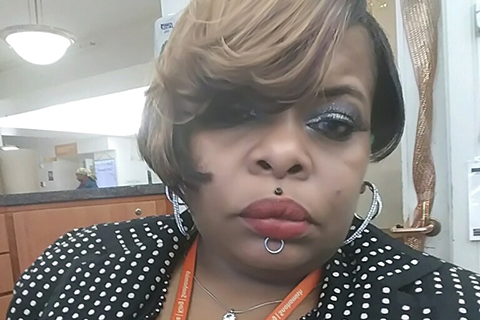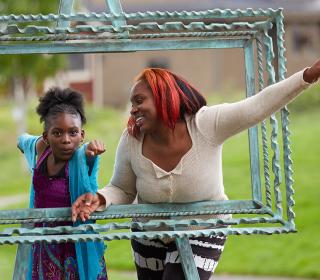"What you give is what you get. And I think I give a lot."
YWCA Seattle | King | Snohomish employs over 200 staff members, each with our own unique stories and reasonings of why we chose to work at YWCA. Whether it stems from some personal experience or watching someone experience injustice, YWCA's staff is robust, committed, resilient, resourceful, and passionate. All these qualities are at the forefront of why Tish works at YWCA. Here are some questions I asked Tish.
Why do you work at YWCA?
When I was experiencing homelessness, other agencies did not treat me or my children well. I found my job at YWCA through the Washington State Department of Social and Health Services (DSHS). They told me that YWCA was hiring for a front desk position so I applied. I work here because I have been in the program participant's shoes. I know the importance of the first contact and how you are treated when you walk into a place and are asking for help. You are vulnerable but not helpless. Though sometimes you are treated like you are your condition and I work to make sure that doesn't happen.
What do you like about working at YWCA?
Firstly, the staff. I think overall staff are friendly, thoughtful, and encouraging. Secondly, I have always been a people person. I always wanted to be in a workplace that helped other people because of the bad experiences I've had at shelters. I feel that YWCA shows love for people who walk through the door. It makes me get out bed. I want to grow with YWCA. Thirdly, I love serving. I like the people we serve. I know words can affect or impact a person's experience when they walk in the door and that's important to me.
You spoke about a bad experience at a shelter. Can you tell me more about that?
Sometimes they belittle you at shelters. I have been belittled. Let me tell you about something I experienced at a shelter in Seattle. That day fish was being served for dinner. I am highly allergic to fish, so much that even the smell bothers me. So I had my three boys, who were teens then, stand in line while I sat in the dining area far from the food. But because I didn't stand in line with my kids, a staff member kicked my kids out of line and that night we all went hungry. I didn't care that I had nothing to eat but my kids deserved a meal. It is completely devastating as a parent to not be able to feed or house your kids. It's not a good feeling at all. Did my kids have to suffer because I had a dietary issue? And because when I spoke up about this incident I felt I was blacklisted, the rest of my experience at the shelter was awful and my 30-day voucher was not renewed.
How do you show up for program participants through your work?
It is a difficult one. Mental illness and trauma are very prevalent and because I've experienced it, I think it allows me, as the first point of contact, to do my job better and empathize with residents. My mother has battled addiction with drugs and alcohol all my life, so I was raised by a grandmother and my aunt. My aunt experienced her own trauma and was raped at a young age and then diagnosed with schizophrenia, which doctors felt may have been a coping mechanism from the rape. So I took care of my aunt as well and I have been around people battling mental health issues.
I did not want to be another statistic or end up like my mother so I knew very early on that I wanted my own family. At 13, I was a single parent and though my world was thrown upside down I knew I had to take care of my baby and keep going. Going through tragedy made me a better person. Just because you come from or are in a bad situation, doesn't mean it has to be the end all or define who you are. YWCA can treat everyone who walks through the door with dignity regardless of their story. YWCA can treat people not based on their circumstance but rather on individual merit with patience, non-judgment, and without a savior complex.
Do you feel you have grown within the agency? If so, how?
I have grown so much since starting at the agency in a part-time role. I recently received a promotion and am now full time as a Resident Guest Program Participant Support Specialist. I have always been in tune with people and have always been good at reading people. I have learned more about how YWCA shows up for the community in terms of how we inform people about services that we offer or who to refer program participants to if we are unable to help them. I am learning to better understand my role at the front desk and get to know the residents. I appreciate critical feedback because I feel it makes me better at my job. I feel that my role equips me with the information I need to share with residents and residents in turn share information with me about what we can do better. I want to be great, not good, great at my job. Since I started working at YWCA my heart has been full.

Salma Siddick is the Social Media & Content Manager at YWCA Seattle | King | Snohomish. An immigrant from Zimbabwe, Salma has lived, worked, and attended school on three continents.
We share the stories of our program participants, programs, and staff, as well as news about the agency and what’s happening in our King and Snohomish community.

